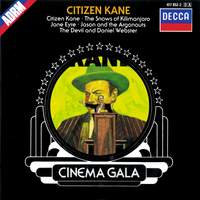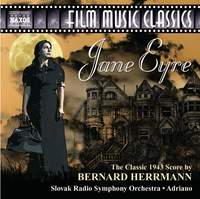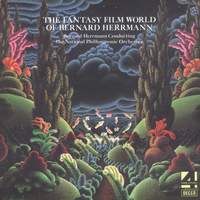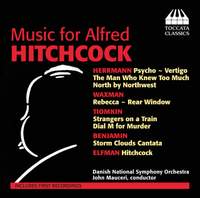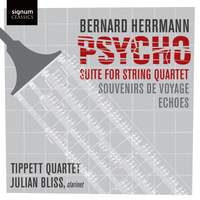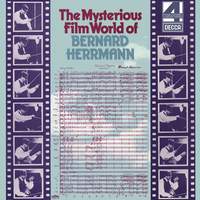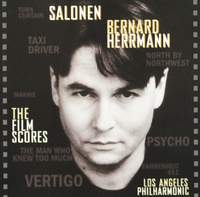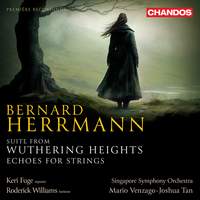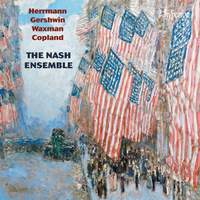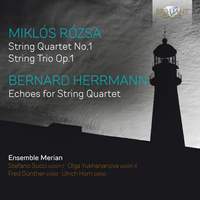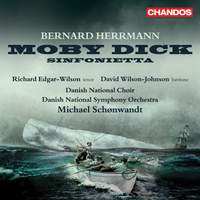Composer Guides,
Bernard Herrmann

June 29th sees the anniversary of the birth of Bernard Herrmann - a successful conductor and composer, whose film-score credits include many of the most influential films of the middle of the twentieth century.
Born in New York to Eastern European Jewish parents, Herrmann was encouraged in his musical pursuits from an early age. A youthful composition won him a prize aged thirteen, and in his younger years he studied with composers such as Percy Grainger. By his early twenties he had even established his own orchestra - the New Chamber Orchestra of New York.
Conducting began to come to the fore in Herrmann’s career from the 1930s - joining CBS (the Columbia Broadcasting System) and making it his mission to advocate for contemporary classical repertoire from the US. He was, in particular, a champion of the works of Charles Ives (to whom he dedicated the cantata Moby Dick) - but also gave US broadcast premieres of works by Myaskovsky, Malipiero, Rubbra and others.
From the 1940s onward, film music took on an increasing role - through his work at CBS Herrmann had met the influential writer Orson Welles. The infamous 1938 broadcast of Welles’s adaptation of H G Wells’s The War of the Worlds, whose realistic, documentary style notoriously fooled large swathes of the US audience into believing the Martian invasion was real, was accompanied by music conducted by Herrmann. His first film-score composition could hardly have been more significant - the iconic Citizen Kane from 1941, which scooped him an Oscar nomination.
After Welles, Herrmann began working with another titan of the big screen - Alfred Hitchcock. Some of Hitchcock’s most famous films - Vertigo, North by Northwest, Psycho and others - are enlivened by scores composed by Herrmann. The unforgettable screeching string motif used in Psycho’s famous shower scene is perhaps his most recognisable legacy. Likewise, his writing for Vertigo combines echoes of Wagner with the use of leitmotifs.

It was not just thrillers that inspired great writing from Herrmann; he worked on numerous Ray Harryhausen fantasy adventures, such as The 7th Voyage of Sinbad and Jason and the Argonauts, as well as episodes of Twilight Zone and the influential French director François Truffaut’s 1966 adaptation of Ray Bradbury’s dystopian Fahrenheit 451. His final completed score was for Martin Scorsese’s neo-noir thriller Taxi Driver; he died in late December 1975, with the film released the following year.
Herrmann was adventurous in his use of orchestration - using just strings for Psycho, strings plus tuned percussion for Fahrenheit 451, and often duplicating instruments for specific effects. Nine harps helped to create the underwater soundscapes for Beneath the 12-Mile Reef; four alto flutes feature in the opening to Citizen Kane, and his score for Torn Curtain uses twelve flutes. The 1953 adventure White Witch Doctor is believed to be the first (and perhaps still the only) use of the serpent in a film score, and he was a keen user of the eerie-sounding theremin (particularly in The Day the Earth Stood Still).
This judicious use of specific sonorities - rather than defaulting to the full orchestra in all circumstances - was influential on later generations of film composers. Composers from Elmer Bernstein to Danny Elfman have adapted his scores. Numerous contemporary composers - Elfman, Sondheim, Alexandre Desplat, Jerry Goldsmith and more - have cited him as a major influence on their own writing.
Perhaps Herrmann’s most lasting legacy, though, is the incredible roster of films scored by him - whether consciously or otherwise, millions of viewers encounter his work when watching these evergreen, critically-hailed screen masterpieces.


Bernard Herrmann (1911-1975)
Curated by David Smith
A selection of some of the best recordings of music by the American composer and conductor, best known for his impressive roster of enormously successful film scores. 2 hours 9 minutes
London Philharmonic Orchestra, The National Philharmonic Orchestra, Bernard Herrmann
Available Formats: Presto CD, MP3, FLAC
Slovak Radio Symphony Orchestra
Available Formats: CD, MP3, FLAC
The National Philharmonic Orchestra, Bernard Herrmann
Available Formats: MP3, FLAC
Klaudia Kidon (soprano), Danish National Symphony Orchestra & Danish National Concert Choir, John Mauceri
Available Formats: CD, MP3, FLAC
Julian Bliss (clarinet), Tippett Quartet
Available Formats: CD, MP3, FLAC
National Philharmonic Orchestra, Bernard Herrmann
Available Formats: MP3, FLAC, Hi-Res FLAC
Los Angeles Philharmonic Orchestra, Esa-Pekka Salonen
Available Formats: Presto CD, MP3, FLAC
Keri Fuge (soprano), Roderick Williams (baritone), Singapore Symphony Orchestra, Mario Venzago, Joshua Tan
Available Formats: SACD, MP3, FLAC, Hi-Res FLAC
Richard Hosford (clarinet), Marianne Thorsen (violin), Laura Samuel (violin), Lawrence Power (viola), Rebecca Gilliver (cello), Ian Brown (piano), The Nash Ensemble
Available Formats: CD, MP3, FLAC, Hi-Res FLAC
Ensemble Merian, Stefano Succi, Olga Yukhananova, Fred Gunther, Ulrich Horn
Available Formats: CD, MP3, FLAC, Hi-Res FLAC
Richard Edgar-Wilson (tenor) & David Wilson-Johnson (baritone), Danish National Symphony Orchestra and Choir, Michael Schønwandt
Available Formats: SACD, MP3, FLAC, Hi-Res FLAC


